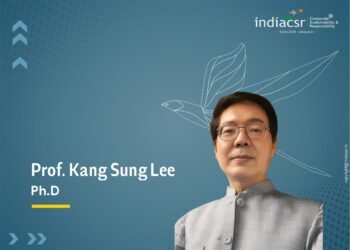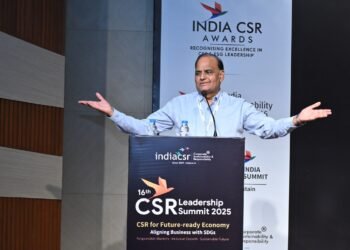Social entrepreneur Kunal Vaid, Founder and CEO, Resham Sutra in conversation with Rusen Kumar, Editor, India CSR, discusses how his desire to free rural women silk workers from drudgery and shame led to the inception of his enterprise Resham Sutra. He also speaks at length about how the enterprise has been innovating renewable energy-based rural livelihood enabling machines, empowering local rural textile artisans, especially rural women, and their families, and leading them to increase their income along with higher productivity. Kunal Vaid opines, “Social enterprises today are breaking new grounds in creating livelihood opportunities and re-inventing rural livelihoods making them more sustainable.”
What is the backstory or motivation behind starting your venture – Resham Sutra? How has the journey been?
After completing my MBA, I (Kunal Vaid) joined my family business at Needlepointe – which was then marketing organic certified silk products from Jharkhand. As the production of our silk products was slow, I visited the production sites, i.e. villages in Jharkhand to understand the bottlenecks. That was my first exposure to the extreme agony and drudgery that rural women went through to make silk yarn based on the painful process of ‘thigh reeling’. I saw the women had cuts on their skin, suffered from backaches and joint pain, and further, their work was socially looked down upon.
Pained with this experience, I came back with a strong feeling that something must be done to free them from this shameful process and drudgery. With that in mind, I started working on making a machine that could provide these women with better productivity and better quality while freeing them from drudgery. This personal machine-making project later blossomed into the foundation of the Resham Sutra.
Resham Sutra is working dedicatedly over the years towards enabling sustainable silk production for bettering rural livelihoods in India. In recognition of our innovations, Resham Sutra won the prestigious Ashden Award, UK, and ISHOW Award by the American Society of Mechanical Engineers. It was also chosen among the ‘Top 5 startups in Agri-Tech’ by the National Startup Mission, Government of India.
How are Resham Sutra’s rural livelihood-enabling machines bringing happiness, greater productivity, and income to the rural women silk workers/artisans across various states? What kind of achievements and social impact is being created by your enterprise?
Resham Sutra helps rural silk yarn producers and fabric weavers of our country to install higher productivity yielding, rural livelihood enabling machines, which increase their income and reduce drudgery and mental stress.Our machines are for reeling, spinning, and weaving silk yarn, which improves working conditions and creates higher income for over 12,000 silk workers in India.
The enterprise is not limited to the manufacturing of machines only. Going beyond, it facilitates the creation of ‘Common Facility Centers’ in villages of India. These centers provide sustainable employment to rural women in the areas of yarn production and fabric weaving. They also provide backward and forward linkages ensuring raw material availability and market linkages for producer groups.
Resham Sutra’s team believes that all-around rural development can be done sustainably and profitably. And thus, we are focusing our activities with and for rural beneficiaries in some of the poorest regions. For instance, we are involved in silk cocoon rearing in forest areas of Jharkhand and Chhattisgarh; silk yarn spinning and reeling in Jharkhand, Odisha, Chhattisgarh, West Bengal, Bihar, Assam, and other states; and handloom weaving with weavers in various Central, Eastern and North-Eastern states of India.
On the socio-economic impact front, Resham Sutra has enabled the beneficiaries to become self-employed, establishing a regular source of income. This is in contrast to previous scenarios, where they were, at best, daily wage earners with irregular jobs. Also, there’s a major improvement in their quality of work, which changes from being hazardous, low-value outdoor work to dignified indoor work.
We further support holistic lifestyle improvements for our beneficiaries — giving them access to better healthcare, education, and life-improving gadgets like solar lighting.
On the environmental impact front,we make maximum use of renewable and low-impact energy sources. Our production centers are end-to-end solar-powered and users can avail the utilities of solar power for daily life applications. Resham Sutra’s deployed RE-based machines already collectively reduce GHG emissions by around 6,000 tons per annum.
What are the key recent developments at Resham Sutra and what are your future plans/projects in pipeline?
Resham Sutra has set up a number of Rural Experience Centres (RECs) in rural clusters; which provide complete buying support including product demonstrations, test runs, financing, after-sales training, and technical support. The RECs also support producers for the value-addition of making yarn and fabric within communities using locally available raw material.
Secondly, Resham Sutra has also been supporting tribal farmers. We facilitate eco-friendly farming, infrastructure building, holistic development, and development in tribal areas. For instance, the ‘silk farm-to-retail project’ in the tribal region of Simdega (Jharkhand), where existing returns from land cultivation is extremely low. Here, Resham Sutra is promoting mulberry plantation with the local rural-tribal farmers; over 200 acres of plantation has been developed by involving over 100 farmers as of date. The enterprise is setting up the farming infrastructure with support from CSR activities of corporates in the region. And simultaneously, women in the community are trained to make silk yarn and weave fabrics using Resham Sutra’s machines. This project aims to stem the migration of the young generation to cities in search of jobs.
In the months and years to come, Resham Sutra will continue to create sustainable livelihoods for the rural poor by providing them farm and non-farm-based employment options — leading to diversification of income sources and cushioning them from agrarian crisis.
As a social enterprise working with and for the rural communities, especially women, to provide them opportunities for self-employment in silk reeling, spinning, and weaving, what are the ground-level challenges or hurdles? And how do you resolve these issues?
A robust last-mile service and distribution network is essential to develop relationships and trust with our customers and ensure ongoing feedback. If service providers and distributors are physically distant from these villages and do not understand the local market characteristics, it may result in a loss of customers and increased operational costs.
Resham Sutra is a one-of-its-kind enterprise that believes in offering complete solutions to its rural customers to ensure that the customers are able to earn a healthy livelihood themselves. Therefore, the enterprise provides end-to-end support to the beneficiaries that include linkages for raw material sourcing, finished goods marketing as well as business and technology support to help improve the income of our rural beneficiaries.
You have been supported by Powering Livelihoods, a CEEW-Villgro initiative. Tell us more about the initiative and how it is helping Resham Sutra to achieve its goals, and to grow and scale?
Powering Livelihoods, a CEEW-Villgro initiative, aims to boost the rural economy by scaling up the penetration of clean energy-powered appliances for livelihoods.
For us, the support from Powering Livelihoods is helping us to scale up and widen our area of impact. We have been able to add initiatives like setting up of RECs, deploying ‘Pay as you go’ technology for inclusive financing, and establishing rural infrastructure for our beneficiaries with their support. Additionally, the programme is helping us build data-based evidence for the impact generated by our work.
What is your objective behind partnering with various NGOs, SHGs, Government agencies, and rural entrepreneurs?
Resham Sutra partners with various NGOs and SHGs for the delivery of various services in remote rural locations. It has set up its Rural Experience Centres (RECs) in rural clusters jointly with local NGOs. Some of the RECs are operated by women-run NGOs. The RECs at first train the rural women to make yarn or fabric. Post-training, the women are helped to form SHGs — which enables them to get into production activities. Thereafter the women are helped to procure machines and raw materials with the support from Resham Sutra’s partner financial intuitions.
Resham Sutra is also supporting tribal farmers in taking up silk farming. At our ‘silk farm to retail project’ in the tribal region of Simdega in Jharkhand, Resham Sutra is setting up farming infrastructure with the help of CSR partners and local administration. Resham Sutra also works with multiple Central and State Government entities to enable rural beneficiaries to procure its machines under subsidies and to provide training to rural women.
Do you believe that social enterprises like yourself can play a bigger role in helping corporates achieve CSR goals?
Yes, surely they can.
Social enterprises today are breaking new grounds in creating livelihood opportunities that didn’t exist earlier and re-inventing rural livelihoods making them more sustainable and palatable in tune with modern times. While traditional occupations like hand weaving and yarn spinning have become unacceptable to new generations, but social enterprises can offer help to present these occupations in a new light, with tools and connectivity that improve income and make production and selling processes suited to modern times. The increased community value creation enabled by social enterprises significantly helps corporates to deliver better outcomes with their CSR projects.






















